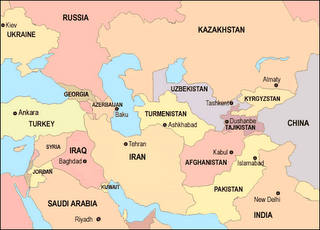
From F. William Engdahl
The Shanghai Cooperation Organization and Iran events
... further underscore the dramatic change in the geopolitical position of the United
States
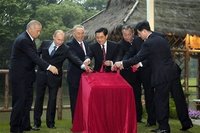
Today the SCO, which has to date been blacked out almost entirely in US mainstream
media, is defining a new political counterweight to US hegemony and its ‘one-polar’ world.
Iran has been invited to become a full SCO member.
.. pending oil and gas deal between China and Iran worth at least $100 billion,
The US had been trying to put massive pressure on Beijing to halt the deal
Another major defeat for Washington.

Iran is also moving on plans to deliver natural gas via a pipeline to Pakistan and India.
The pipeline progress is a direct rebuff to Washington's efforts to steer investors clear of Iran. Ironically, US opposition is driving these countries into each others’ arms, Washington’s ‘geopolitical nightmare.’

India, which Bush is personally attempting to woo will also be invited to join SCO.
Mongolia and Pakistan will be invited to join SCO. SCO is gaining in geopolitical throw-weight quite substantially.
Iranian membership in SCO could ‘make the world more fair.’
... building an Iran -Russia ‘gas-and-oil arc’ in which the two giant energy producers would coordinate activities.
US out in cold in Central Asia
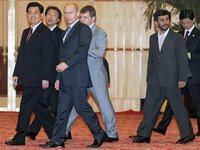
By virtue of SCO membership, Iran can now take part in SCO projects, which in turn means access to badly-needed technology, investment, trade, infrastructure development.

Iran sits on the world’s second largest natural gas reserves, and Russia has the largest. Russia is the world’s second largest oil producer after Saudi Arabia. These are no small moves.
India is desperate to come to terms with Iran for energy but is being pressured by Washington not to.
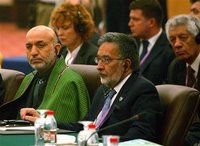
The Bush Administration last year tried to get ‘observer status’ at SCO but was turned down. The rebuff - along with SCO's demands for a reduced American military presence in Central Asia, deeper Russia-China cooperation and the setbacks to US diplomacy in Central Asia – have prompted a policy review in Washington.
Gennady Yefstafiyev, a former general in Russia's Foreign Intelligence Service, says, ‘The US's long term goals in Iran are obvious: to engineer the downfall of the current regime; to establish control over Iran's oil and gas; and to use its territory as the shortest route for the transportation of hydrocarbons under US control from the regions of Central Asia and the Caspian Sea bypassing Russia and China. This is not to mention Iran's intrinsic military and strategic significance.’
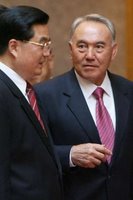
Washington had based its strategy on Kazakhstan being its key partner in Central Asia. The US wants oil transportation via Baku-Ceyhan pipeline. But Kazakhstan isn’t playing ball. President Nursultan Nazarbayev went to Moscow on April 3 to reaffirm his continued dependence on Russian oil pipelines. And China is making major energy and pipeline deals with Kazakhstan as well.
Washington's relations with Uzbekistan today are disastrous. The US effort to isolate President Islam Karimov, along lines of the Ukraine ‘Orange Revolution’ tactics, is not working.
Tajikistan relies heavily on Russia's support. In Kyrgyzstan, despite covert US attempts to create dissensions within the regime, President Burmanbek Bakiyev's alliance with Moscow-backed Prime Minister Felix Kulov, is holding.
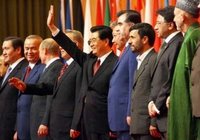
In the space of 12 months Russia and China have managed to move the pieces on the geopolitical ‘chess board’ of Eurasia away from what had been an overwhelming US strategic advantage. It’s potentially the greatest strategic defeat for the US power projection of the post World War II period.
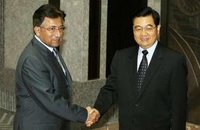
This is also the strategic background to the re-emergence of the so-called realist faction in US policy.
No comments:
Post a Comment